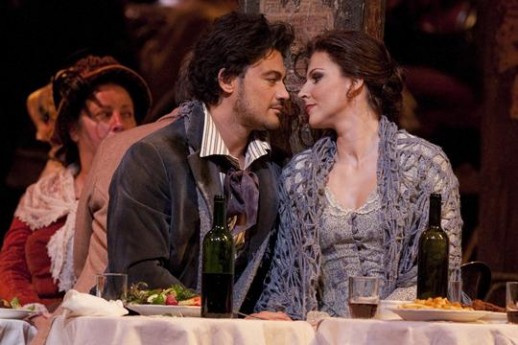
Vittorio Grigolo is the ideal candidate for such an operation. He is handsome, hunky, photogenic, with a dark lustrous mane of artfully disheveled hair, an expressive face and a sexy pout: a blessing for the HD broadcasts. If on the one hand his “checkered” past as a crossover artist may raise some brows in the ivory tower of opera purists, on the other it has undoubtedly contributed to his popularity in the world at large, and made it easier for his handlers to sell him.
In any event, in the past few years, in a strategically planned career move the Italian tenor has concentrated all his efforts in trying to erase from the audience’s mind his association with Il Divo and Katherine Jenkins, focusing himself exclusively to gain respect as a bona fide operatic tenor, arranging high profile debuts in crucial opera houses in a repertoire that is – with a couple of exceptions -suitable to his talent.
Just a few months ago he made a splashing debut at Covent Garden as Des Grieux in Massenet’s Manon, accomplishing – by most accounts – the formidable task of equaling, if not downright upstaging his partner, Anna Netrebko. Later this season, though not a house debut, he will add the pivotal role of Romeo in Gounod’s opera at La Scala. In between is the debut, his first bow to the Metropolitan Opera as Rodolfo in La Bohème.
For once, such anticipation was not entirely misplaced. Grigolo does have indeed an attractive instrument characterized by a tight, or fast vibrato, an upper register rich with overtones and a significant squillo. Being basically a high-placed voice, the top is its most appealing and enticing part; his first act romanza was capped with a glorious high C.
In the middle register not all was so smooth, and especialy in the first act, he tended to excessively stress almost every single syllable, to the detriment of a true legato. There were plenty of small, repeated explosions of sound, as well as a tendency to lengthen the last syllable of a phrase (chi sonoooo? Sono un poetaaaa), a mannerism of late career Pavarotti. The feeling was of someone trying very hard, too hard, in fact, to make himself heard. He was not completely at ease with the classic Puccini “canto di conversazione”, which requires complete naturalness and simplicity of delivery.
Rarely has a production seen such a vast number of debuts in the most important roles. In the hierarchy of importance and expectations, the silver medal would be awarded to another heavily publicized singer, soprano Takesha Meshé Kizart. I am not in complete agreement with the well-established Met tradition to assign the role of Musetta to spinto/dramatic sopranos.
Ms. Kizart possesses a sizable, robust, dark-hued voice, with plenty of decibels but no stranger to the habit of scooping up to the top notes, which were also a bit flat (for example, the first B natural of her Waltz, which she attempted, somewhat unsuccessfully, to fade from forte to piano). I would like to close one eye over her diction, but it is difficult to ignore mispronunciations such as “povvereta” and the abundance of English t’s and r’s.
In any case, I found myself frequently wishing for a switch of the two ladies’ roles. Considering that my favorite Mimìs are Mirella and the two Renatas, it should come as no surprise that in my opinion Majia Kovaleska’s soprano is a few sizes too small for my taste. The Latvian soprano, the only Met “veteran” of the quartet of lovers, is apt at portraying Mimi’s fragility and delicateness, but in her outbursts of desperation she sounded as if singing only “on her capital.” I have no doubt that with her musicianship, sensitivity (and excellent Italian diction) in a much smaller house or in a recording she could be an almost ideal Mimì. At the Met, Kovaleska ended up invariably covered by Grigolo when singing together.
Fabio Capitanucci was as good as it gets as Marcello. At this point of his career he has a well placed, rich and compact thought not large lyric baritone. Let’s wait and see what he can do in more rewarding roles. Shenyang’s bass (Colline) sounded largely swallowed by the cavernous Met, and Edward Parks acquitted himself honorably in the thankless role of Schaunard.
Conductor Roberto Brizzi Brignoli showed a tendency towards dragging tempos, so that the synchrony between pit and stage was at times less than ideal.
But all this did not matter, because everybody in the audience had eyes and ears only for one person, who was greeted with a long enthusiastic ovation at curtain call, which he seemed to savor perhaps a bit more than taste allows. I understand that this had been devised to be his night, and in any case (to borrow a phrase someone recently wrote about Gustavo Dudamel) – his talent is large enough that his publicist does not have to put too much perfume on a stinking bomb.
(Photo: Marty Sohl/Metropolitan Opera)


